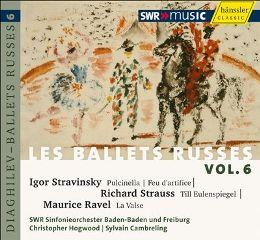Les Ballets Russes Vol.6 (2010)
Les Ballets Russes Vol.6 (2010)

Igor Stravinsky - Pulcinella Ballet with three solo voices after Giovanni Battista Pergolesi 1 Ouverture 01:45 2 Serenate (Tenor) "Mentre l'erbetta" 03:23 3 Scherzino 06:02 4 Ancora poco meno (soprano) "Contento forse vivere" 01:56 5 Allegro assai 02:05 6 Allegro (basso) "Con queste paroline" 02:13 7 Pergolesi Andante (Terzetto) "Sento dire" 02:32 8 Tenor "Chi disse ca la femmena" 00:29 9 Allegro (Duetto soprano/tenor) 00:36 10 Presto (Tenor) "Una te fallan zemprecce" 01:43 11 Allegro 01:08 12 Tarantella 01:19 13 Andantino (soprano) "Se tu m'ami" 02:37 14 Allegro 04:03 15 Gavotta con due variazioni 04:03 16 Vivo 01:31 17 Tempo di minuetto (Terzetto) "Pupillette fiammette" 02:06 18 Allegro assai 02:08 19 Fireworks op. 4 A fantasy for large orchestra 04:11 Richard Strauss - Till Eulenspiegel Merry Pranks op. 28 20 After the old rogue's tale, set in rondo form for large orchestra 13:59 Maurice Ravel 21 La Valse op. 28 Poème choréographique 13:31 Arleen Augér – soprano Robert Gambill – tenor Gerolf Scheder - bass SWR-Sinfonieorchester Baden-Baden und Freiburg Christopher Hogwood – conductor (1-18) Sylvain Cambreling – conductor (19-21)
In 1917 Diaghilev's Ballet had a great success with a tableau by Goldoni: The Good Humored Ladies, with music by Domenico Scarlatti arranged by the contemporary Italian composer Vincenzo Tommsini. Diaghilev now requested a similar work from Stravinsky. Selecting the music of G.B. Pergolesi for his inspiration, Stravinsky constructed his score from fragments and scraps of unfinished works to compose a ballet with a unified course of action and various scenes. The resulting score was Pulcinella, and was inspired by a collection of stories documenting the amorous adventures of this character from the commedia dell'arte. Stravinsky's youthful, orchestral showpiece, "Feu d'artifice" was composed as a wedding present for Nikolai Rimsky-Korsakov's daughter. However, a connection with Diaghilev still exists: the impresario was in the audience when the piece was performed in St. Petersburg in 1909, prompting him to commission the composer for a new work that would become "The Firebird." In 1917, Diaghilev drew on another pre-existing piece for his production of Strauss' "Til Eulenspiegel" - which would become the last piece Nijinsky would perform with the Ballet russes. Ravel's "La Valse" - originally conceived as the tone poem "Wien" - was commissioned by Diaghilev, but was later rejected - a decision that resulted in a permanent break with the composer. --- haenssler-classic.de
Finding Igor Stravinsky, Richard Strauss, and Maurice Ravel side-by-side on a CD is a little unusual, but it shouldn't be surprising if it's Volume 6 in Haenssler's diverse series Diaghilev--Les Ballets Russes. Considering that Stravinsky's Pulcinella and Feu d'artifice, and Strauss' Till Eulenspiegels lustige Streiche were staged as ballets by Sergei Diaghilev, and that Ravel's La Valse was planned for performance with Pulcinella but ultimately rejected by the impresario, all these works share the dance impulse, as well as a connection with the early 20th century's most influential modern dance company. Yet a problem with this series is the variability of performances, and listeners are not always treated to the most desirable recordings. The SWR Symphony Orchestra of Baden-Baden and Freiburg performs with distinction in all four works, though Christopher Hogwood presents Pulcinella and Sylvain Cambreling offers readings of Feu d'artifice, Till Eulenspiegel, and La Valse that make this disc feel a little uneven and difficult to absorb in one sitting. Stylistically, this is to be expected, for each work comes from a different musical tradition, whether Italian, Russian, German, or French, and represents an aspect of late Romantic or modern music that is to some extent at odds with the others. But while Hogwood's performance of Pulcinella is mostly bright, crisp, and uptempo, befitting its neo-classical style, it sometimes hits pockets of sluggishness and dullness. Furthermore, Cambreling's renditions are in softer focus, suggestive of quasi-impressionist interpretations, and tend toward a more homogenous orchestral blend, which is blurred somewhat in the highly resonant ambient acoustic. Fans of the Ballets Russes' extraordinary history will find this disc enlightening and will likely collect the entire series, but anyone who wants just one piece above the rest is advised to seek out other recordings of these popular works. ---Blair Sanderson, Rovi
download (mp3 @320 kbs):
uploaded yandex 4shared mega solidfiles zalivalka cloudmailru filecloudio oboom clicknupload








